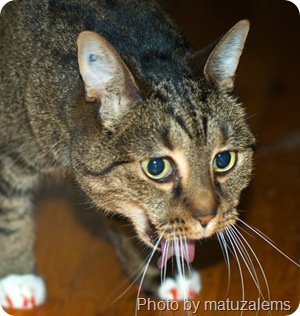Introduction
I hope you find this page useful. It has been updated. One of the difficulties for a good cat caregiver is to know whether there cat is genuinely ill if and when they vomit. Domestic cats are good at vomiting. But sometimes it’s just a day-to-day matter; something not to concern a good caregiver. But you’ve got to know when it’s a real health problem or nothing to worry about. The chart below helps in making that assessment. I can think of two reasons why a cat might vomit which aren’t concerning namely a hairball and secondly eating too fast or overeating.
Sometimes kittens are fed from the same bowl and they may compete and in competing eat too fast. Separating kittens will help to resolve this problem.
As a general guideline, “If a cat vomits once or twice but appears perfectly normal before and after, the problem is not serious and can be treated at home. Vomiting unrelated to eating is frequently a sign of an infectious disease…. Another serious cause of vomiting is ingesting a poison or a drug.” And thirdly vomiting is associated with peritonitis. I have started with this funamental information because sometimes people want quick answers. But please read on for more detail.
The article is over three sections with links at the base of each section to the next for technical reasons.
I have used excellent sources in preparing this page on cat vomiting. Treatments are not often mentioned as this is for veterinarians to decide based on the symptoms. References in the text are to 5 books listed at the base of the page numbered 1–5 (hence the numbers after text). I have made a reference to the books in this way because if the same information comes up several times from different books this lends support to the fact that it is sound information. Infrequently, I have also referred to online sources which are embedded in the text (these tend to be less useful than a good book).
An interesting section in this article is one where I describe the types of vomiting and the possible causes. This can help readers to assess whether the problem is serious requiring urgent betting attention or whether they can simply observe and wait and watch.
The page is in two parts. The first part was written about 12 years ago and the second part was written recently on December 31, 2021. I felt I needed to upgrade the page and provide more information. Once again, I’ve used an excellent source, Dr. Bruce Fogle.
Can you share your experiences and help?
Causes of feline vomiting
Vomiting is a common occurrence in cats. It is the result of stimulation of the ‘vomiting center of the brain’ by receptors in the digestive tract (1). Sometimes the cat will yowl before or after vomiting (2).
It can be due to regurgitating at will to relieve indigestion (4). This is a passive act in contrast to the harsh gagging sound when vomiting (1). Sometimes undigested food is brought up with little effort. This is probably not something to be concerned about (5). If the cat vomits 1 – 2 times and is otherwise in good health, is not considered to be serious (1). The question is whether it is serious. It can be caused by (see more causes below):
- many diseases
- general ailments
- digestive disorders
- overeating or eating too fast (another common cause (1)). This may be due to competition between several kittens eating from the same bow. Separation and putting less food down will probably help (1).
- food allergies
- hair balls or grass or foreign indigestible substance (these are the most common reasons (1))

Type of vomiting indicating cause
The way the cat vomits can help in diagnosing the cause (1). Clearly this depends a bit on knowing your cat’s lifestyle. For instance, does she go out? Does he tend to chew on odd objects etc. An outdoor cat that starts to vomit should be kept in for observation of behaviour and stools and to prevent further problems that may have occurred outside:
| Type of cat vomiting or material vomited and symptoms (source: 1 – unless stated otherwise) | What it indicates (source: 1 – unless stated otherwise) |
| Repeated – vomiting, retching, bringing up frothy clear liquid |
|
| Chronic & Episodic |
|
| Chronic & progressive – weight loss? – depression? – stomach distended? (2) |
|
| Acute to occasional (2) – kittens – worms – potbellied? – diarrhea? |
|
| Acute to sporadic – cat eating plants? – cat is a hunter – eats prey? – drooling – lethargy (2) |
|
| Frequent & Acute – history of eating non-food things (2) |
|
| Acute (2) |
|
| Rapid onset & Acute – diarrhea? – anemia? (2) |
|
| Sporadic – not continuous and unrelated to eating – appetite also poor – listless |
|
| Occasional – long haired cat? |
|
| Blood – serious condition |
|
| Fecal – vomiting stuff that looks/smells like feces – serious |
|
| Projectile |
|
| Foreign objects | These can be:
|
| Motion sickness | This is what humans get sometimes. Apparently, vets can prescribe medicine to minimize the effects. Best to travel on an empty stomach. |



My immediate thought is that your cat or cats are eating litter. That is not impossible to imagine. I have a page on it – see link below. I’d watch them and change the litter to one that is completely different. https://pictures-of-cats.org/purina-breeze-cat-litter-can-take-on-the-smell-of-cat-food-from-their-poop-and-some-cats-eat-it.html – this is serious I would suggest so please take urgent action. See a vet if needs be.
I have many cats but I am now seeing grey cat vomit that looks like fine grain kitty litter.. I ahve sen it 5 or 6 times now… any ideas?